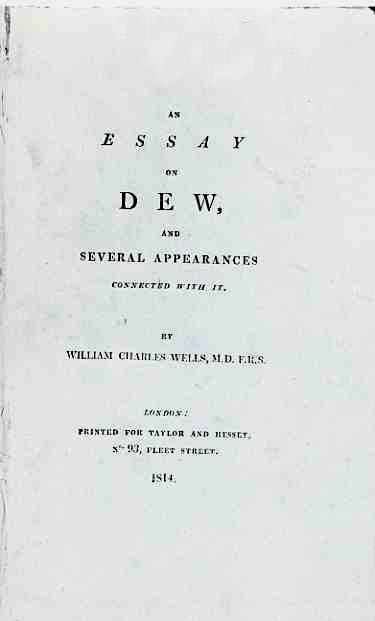JF Ptak Science Books LLC Post 515
Little things comfort us because little things distress us. Blaise Pascal
Science is simply common sense at its best. ~Thomas Huxley
Physics is imagination in a straight jacket. ~John Moffat
Science does not know its debt to imagination. ~Ralph Waldo Emerson
Moderation, which consists in an indifference about little things, and in a prudent and well-proportioned zeal about things of importance, can proceed from nothing but true knowledge, which has its foundation in self-acquaintance. Plato
William Charles Wells (1757-1817), a Charleston-born Londoner who was the physician to St. Thomas's Hospital from 1800-1817, did one of those great, little experiments (sort of but not really like Charles Darwin crawling around on his imaginarily-sick tummy at Downs watching worms) from which big things were born. The experimentation, lovely and penetrating and elegant, took place over several years from 1812 to 1814, were published in this semi-slender, 146 page tract, which the great Thomas Huxley called "a model of wise inquiry and lucid exposition". (Actually, 146pp on dew might seem like a lot until you consider what dew is all about.) What Wells so ably exposed about dew was its great terrestrial demeanor--that the movement of dew, its accumulation and dissipation, was due to nothing less than radiation from space, regulated (or interrupted) by the action of the Sun and clouds, 'introducing a clear view of what is now called the radiation balance of the atmosphere". (W. Middleton, A History of the Theories of Rain, pp 188-191). So this is a bit of smallness, something small and seemingly insignificant, leading from its own bit of nothingness into a theory of radiation from space and a theory of the atmosphere, a result almost completely unanticipated. It is too in its own way somewhat like Robert Hooke re-introducing the often seen and little liked flea--showing people what the flea actually was, under magnification for the first time, showing what sort of world was going on in front of us that was simply just too small to see.



Comments